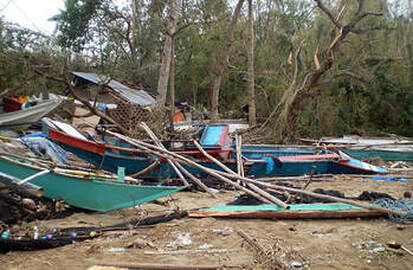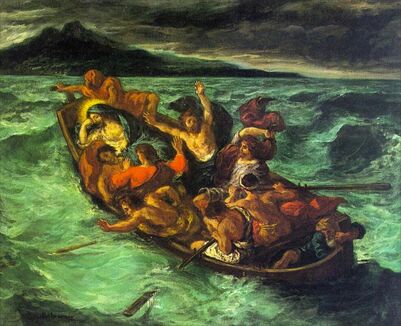 Being lost and not having solid ground under our feet, can be make us feel frustrated, angry and scared. Last August, I flew to Paris to meet up with my wife Sylvia who was in a conference for a week in the UK. Upon arriving in Paris, at first I felt a sense of familiarity. Like the San Francisco bay area (where I lived for 17 yrs), Paris felt very ethnically diverse. I crossed paths with two friendly French people who spoke some English: first a young university student with a girlfriend who helped me read the subway map. The second was a friendly older French lady on the train who told me that Koreatown wasn’t too far away. In the end of our chitchat, she said, “Welcome to Paris. I hope you have a great time here.” This is going to be a great trip, I thought to myself. I was supposed to meet Sylvia at an Airbnb in the Koreatown section of Paris. When I got off from the subway to the streets of Koreatown, it was dark - about 10:30 pm. I whipped out the map I had printed out of google, and started looking for “29 Rue de Belleville,” but then discovered there were no street signs (the next day I learned that Parisian street signs are plastered on the buildings - it’s a European thing). I problem solved this issue creatively: as a visual learner, I used the street shapes and patterns in the printed google map to guide me to my destination. It took a few explorations and turnarounds, but eventually I got to the Airbnb location. It was an apartment building in the middle of a neighborhood replete with Asian grocery stores (a mix of Vietnamese, Chinese and Korean). I stood on the sidewalk exhausted, thirsty and hungry, but Sylvia was nowhere to be found. The apartment gate was locked. I double checked the address three more times. I asked a young French guy who just parked his motorbike in sign language and naming the street just to make sure, and got a clear “Oui”. Still no Sylvia. Forty minutes passed I started to regress. “How can she do this to me? She knows I don’t speak French. Do I really have to stay in the streets for the night?” Feeling desperate, I looked at restaurant across the street and gathered up the courage to ask the young pretty waitress to see if she speaks enough English to help. She said “Non.” I was about to throw in the towel and surrender to the possibility that I might become a homeless person in Paris. But she spoke to her boss, an older lady in her 50’s. Her boss then made an announcement to the few late night customers seated at the table of the restaurant on the sidewalk to inquire if anyone spoke English. A young woman who spoke a little English raised her hand. Geez Louise - finally! She had a kind face. I tried my best to make myself look as desperate as possible. I explained and pointed across the street that my wife is in an Airbnb in that building, but there is no way for me to communicate with her. (I had not set up my cell phone for calls in international travel). At first, she had the look of resignation. All of a sudden her face lit up and said, “Do you want to use my phone?” I said, “I don’t have her building’s phone number.” I felt defeated once more. Then I said, “Do you have Facebook on your phone?” “Oui”, she replied. It took about three attempts of FB messaging, before Sylvia replied. Then she came out of the building to meet me. I scolded her, but I was glad to find her at last. I hated feeling disoriented, disconnected and lost. However, because life is transient and ever-changing, I understand that I am guaranteed to feel these feelings again in my life journey. In travelling, it’s a bit of a cliche when we say, “It’s not just about the destination, but it’s about the journey.” Flexibility is the key here. While we might have a map, we (sometimes) need to let go of the map. It’s a tough challenge: to be present in the here and now moment and deal with “what is”, instead of holding on to our premeditated plans like a stubborn barnacle. Indeed, egoic desire and attachment causes suffering. There is wisdom in going with the flow (thus sayeth the California hippie). It took asking three non-English speaking people before I found my guardian angel that night. I once heard an ancestral story told by my dad that took place sometime during the turn of the century. My great grandfather Eugenio - a fisherman and farmer in Mindanao, southern Philippines - ordered my young grandfather Francisco (or Isko) to take their one bangka out into the deep sea in the midst of a fast approaching storm. My young grandfather Isko thought that his “tatay” (father) had gone mad, but at that moment it was not for him to question him, for there was no time to explain. As Isko rowed his bangka out to deeper waters, he noticed that the waves were getting bigger and stronger. He rode on the giant waves for about an hour until the storm ceased. When he rowed back to the beach, he saw that the other bangkas on the beaches were crushed by the ginormous waves that slammed against the shoreline. Here’s the cud that needs some chewing. There is a way in which utter dependence on hard solid ground is not what we need at certain times of our lives. Sometimes as scary as it may be, we need to go out to the deep even without knowing exactly why, and ride the crest and trough of stormy waves. May we gain the courage to do so. Comments are closed.
|
Donnel Miller-MutiaJoin me in chewing the cud on mindful communication and relationships, self-awareness, spirituality and mythology. Archives
May 2024
Categories |
Proudly powered by Weebly

 RSS Feed
RSS Feed
